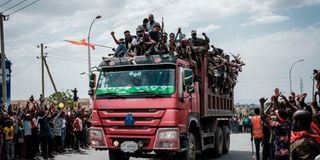Ethiopia's Tigray rebels accused of shelling, shooting civilians

Tigray soldiers arriving in Mekele on June 29, 2021.
Rebels from Ethiopia's war-hit Tigray opened fire on civilians while looting and shelling villages and towns in the neighbouring Amhara region earlier this month, killing and wounding dozens of people and possibly many more, witnesses said on Wednesday.
The Amhara regional government described the violence in and around the town of Kobo as a "massacre", although the Tigray People's Liberation Front (TPLF) rebel group has previously denied claims it has targeted civilians in northern Ethiopia's 10-month-old war.
Witnesses said the violence erupted on September 9 in the village of Gedemeyu, seven kilometres south of Kobo, after TPLF fighters began searching homes for firearms and other weapons.
Residents fought back and drove the TPLF out of the town, but the rebels began attacking civilians as they fled north, then returned the following day to carry out more attacks, the witnesses said.
The area around Kobo is predominantly lowland sorghum and onion farms.
A communications blackout there made it difficult to verify accounts from the witnesses, who have fled more than 150 kilometres south to displacement camps in the town of Dessie.
'Mass shooting spree'
"They massacred farmers... and seasonal agricultural workers who came to the area from neighbouring highlands," one witness from Kobo town said.
"I have seen the dead bodies of seven people in one compound. Four of them were from the same family," he said, adding he had passed "many" other bodies while walking south to Dessie.
The witness, who spoke on condition of anonymity so as not to endanger relatives left behind in Kobo, accused federal authorities of neglecting the area after TPLF forces started pushing south into Amhara from Tigray in July.
Another man in Dessie told AFP he had returned north to survey damage in Zobel, a village near Kobo, and had seen dead bodies and destroyed buildings.
"In a mass shooting spree the TPLF inflicted heavy damage on civilians... It fired heavy artillery on civilians and civilian property," he said, adding that a health facility was hit and other government buildings were looted and vandalised.
Amhara government spokesman Gizachew Muluneh tweeted that hundreds of people may have died, but he provided no evidence for this claim.
"We are informed that many hundred civilian Amharas have been massacred by the terrorist TPLF. We will make public the exact number of people massacred once we investigate the crime," he said.
The TPLF said such claims were "totally wrong" and called for an independent investigation.
'Disturbing reports'
Northern Ethiopia erupted in conflict last November after Prime Minister Abiy Ahmed sent troops to topple the TPLF, a move he said came in response to TPLF attacks on army camps.
He promised a swift victory, but fighting in Tigray dragged on until late June when the TPLF stunned the world by retaking most of region, including its capital Mekele.
The rebels then pushed east into Afar and south into Amhara.
The conflict has killed thousands of people and left hundreds of thousands of others living in conditions bordering on famine, the United Nations says.
The Ethiopian Human Rights Commission (EHRC), a government-affiliated body, said this week it had received "disturbing reports" of alleged TPLF abuses against civilians in Kobo "including shelling of civilian areas, house-to-house search and killings, looting and destruction of civilian infrastructure".
The TPLF says it is fighting in Amhara to break a humanitarian "siege" amid fears of widespread starvation deaths in Tigray.
The rebels have accused Abiy of sending "priests, women and children" into battle as cannon fodder.
Thousands of residents have enlisted to fight in recent recruitment drives called by Abiy and Amhara officials.
The fighting in northern Ethiopia has persisted despite international calls for a ceasefire, and last week US President Joe Biden signed an executive order allowing for sanctions against the warring parties if they fail to commit to a negotiated settlement.





